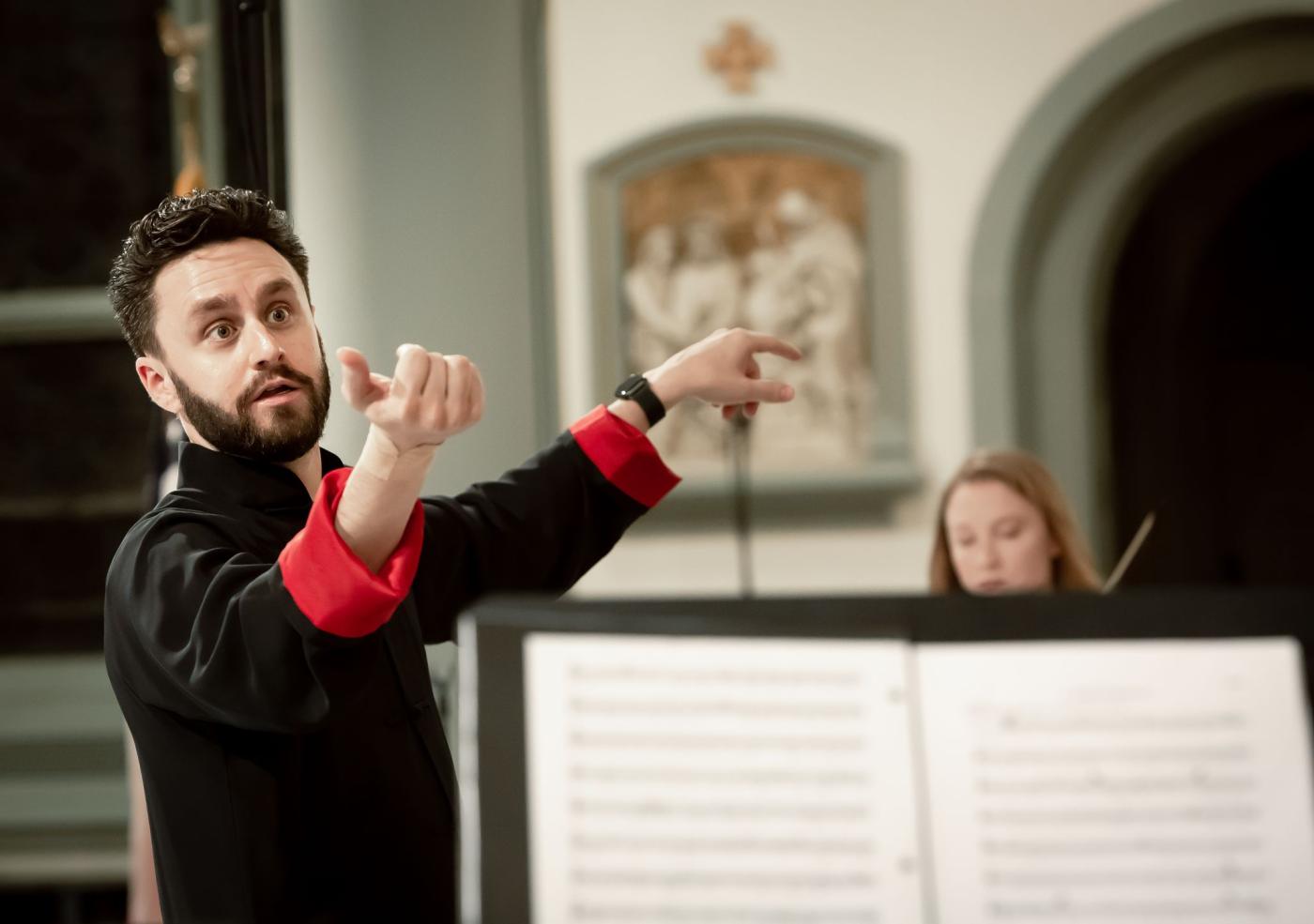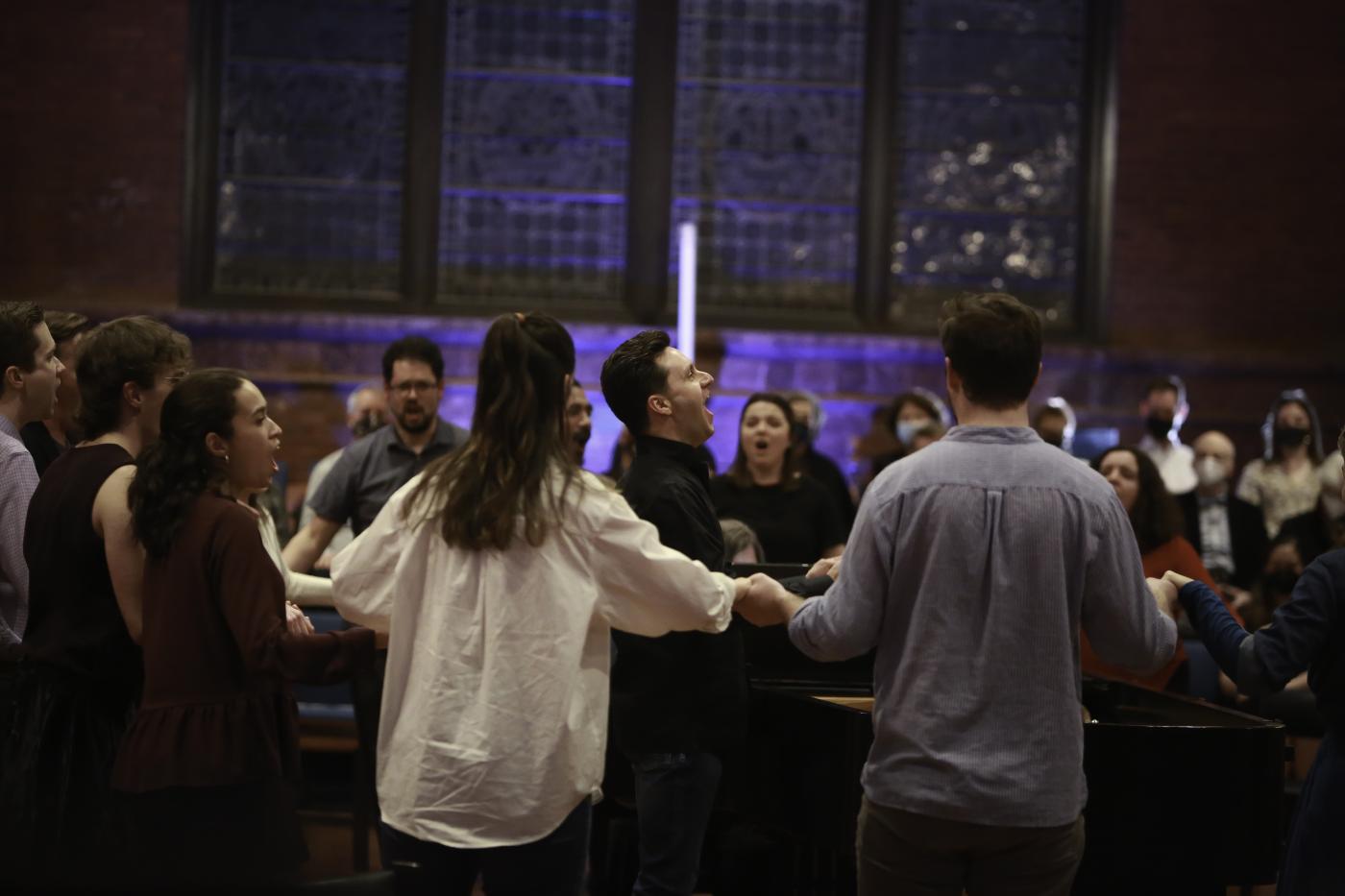This year, classical music lovers across the world are celebrating the 150th birthday of the beloved composer, Sergei Rachmaninoff, born on April 1, 1873. From memorable melodies inspiring top pop songs to iconic pieces in the classical music repertoire, Rachmaninoff has touched the hearts of both musicians and audiences alike for well over a century. And so, the music world is in for a treat as ensembles celebrate the beloved composer this year with programs of Rachmaninoff’s decadent music.
The professional choir and orchestra The Thirteen is excited to invite you to join their musical birthday celebration as they perform Rachmaninoff’s All-Night Vigil on March 3-5, 2023 in Alexandria, VA downtown Washington, D.C., and Bethesda, MD. Celebrated bassi profundi Glenn Miller and Eric Alatorre join their choir of 23 for this iconic work.
We are thrilled to hear more about this program from The Thirteen Artistic Director and Conductor, Maestro Matthew Robertson!
In 1985 the Choral Arts Society of Washington, led by Norman Scribner, collaborated with the great Russian cellist, conductor, and Music Director of the National Symphony Orchestra, Mstislav “Slava” Rostropovich, for a performance and recording of Rachmaninoff’s All-Night Vigil, alternately known as his Vespers. This recording was among the first – if not the first – Western recording of this masterpiece. A 21st century reader must stop and appreciate how monumental of an undertaking this was in 1985: The Iron Curtain was still largely intact, making a recording like this not only politically difficult but musically fraught as well. Not only was the sheet music for the work then unpublished, but the extraordinary demands Rachmaninoff places on the bass singers also required Scribner to place an ad in The Washington Post with an image of a low B-flat note, with the plea: ‘if you can sing this note, come sing with us!’ (Fortunately for The Thirteen, the ultra-low bass writing in our performances will be handled by celebrated bassi profundi Glenn Miller and Eric Alatorre.) Norman’s recording was released to critical acclaim and spurred a flurry of recordings from other American ensembles.
While my interaction with this recording likely began in utero (my dad sang in Choral Arts, and this recording and I were released at around the same time), my first memorable interaction with it was when, to my parents’ surprise, I used the CD booklet as a canvas for “Masterpiece in Crayon, age 3.” The recording served as a keystone of the musical backdrop for my childhood, and even at a young age I remember being inspired by its deep harmonies, mysterious tone, and lush musical language. Norman Scribner would become one of my earliest conducting teachers, and, later, an advocate for The Thirteen, serving on our Artistic Advisory Board until his death. While my musical sensibilities have changed since first hearing this recording, it was in my early childhood that my connection to this work began.
Fundamentally, the Vigil responds to the question of how to respond to a world in crisis. Rachmaninoff composed this work in 1915 as ‘the war to end all wars’ ravaged Europe and the Bolsheviks gained power in Russia. For a 21st century audience, it is difficult to imagine not only the unfathomable scale of the loss of human life, but also the way in which the advent of mechanistic forms of warfare fundamentally altered humanity. Rachmaninoff’s contemporaries dealt with this existential fissure by fundamentally changing the way they wrote music: It was around the time that Rachmaninoff wrote his Vigil that Stravinsky penned the driving and mechanistic Rite of Spring, Mahler wrote his late symphonies which explore the intersection of beauty and brutality, and Schoenberg developed a completed new tonal system for a new age. Eschewing the musical language of modernity in his Vigil, Rachmaninoff instead wrote an unrepentantly Romantic masterpiece with the goal of national and transnational unity (Church Slavonic – the language of the Vigil - is the lingua franca of the Eastern Orthodox Church as Latin is to Western Christianity). It is ironic that Rachmaninoff, in writing his greatest masterpiece, created a work that looked backward to the ancient tradition of chant as inspiration.
Of the Vigil, our program annotator, Steven Plank writes:
The All-Night Vigil may seem exotic to the modern Western listener. Its reliance on chant, its generous slowing of time, its fullness of sound, its abiding in a world of mystery, all combine to create a work of distinctive character. In that distinctive character we hear the voice of the composer returning to a rootedness and tradition at a time of instability… in the All-Night Vigil he summons strength and calm at a time of chaos.
Over a century later, we are once again asked the question of how to respond to a world in crisis, namely: Russian President Vladimir Putin’s war in Ukraine. While there is no question that Rachmaninoff identified as deeply Russian, I like to think that his own experience of fleeing the Bolshevik revolution would have made him a kindred spirit to fleeing or fighting Ukrainians today. And his Vigil - in which barbarism, the mechanistic, and modernity are all absent and in which expression and mystery reign - is the musical antithesis of war.
I’ve delighted in returning to this old friend as a conductor in preparation for our performances; I hope you’ll join me in celebrating Rachmaninoff’s 150th birthday and his All-Night Vigil.
-Matthew Robertson
Artistic Director, The Thirteen
To read the program notes for All-Night Vigil in their entirety, click here.
PBS PASSPORT
Stream tens of thousands of hours of your PBS and local favorites with WETA+ and PBS Passport whenever and wherever you want. Catch up on a single episode or binge-watch full seasons before they air on TV.

